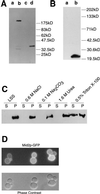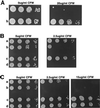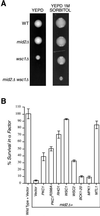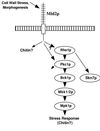Saccharomyces cerevisiae mid2p is a potential cell wall stress sensor and upstream activator of the PKC1-MPK1 cell integrity pathway
- PMID: 10348843
- PMCID: PMC93798
- DOI: 10.1128/JB.181.11.3330-3340.1999
Saccharomyces cerevisiae mid2p is a potential cell wall stress sensor and upstream activator of the PKC1-MPK1 cell integrity pathway
Abstract
The MID2 gene of Saccharomyces cerevisiae encodes a protein with structural features indicative of a plasma membrane-associated cell wall sensor. MID2 was isolated as a multicopy activator of the Skn7p transcription factor. Deletion of MID2 causes resistance to calcofluor white, diminished production of stress-induced cell wall chitin under a variety of conditions, and changes in growth rate and viability in a number of different cell wall biosynthesis mutants. Overexpression of MID2 causes hyperaccumulation of chitin and increased sensitivity to calcofluor white. alpha-Factor hypersensitivity of mid2Delta mutants can be suppressed by overexpression of upstream elements of the cell integrity pathway, including PKC1, RHO1, WSC1, and WSC2. Mid2p and Wsc1p appear to have overlapping roles in maintaining cell integrity since mid2Delta wsc1Delta mutants are inviable on medium that does not contain osmotic support. A role for MID2 in the cell integrity pathway is further supported by the finding that MID2 is required for induction of Mpk1p tyrosine phosphorylation during exposure to alpha-factor, calcofluor white, or high temperature. Our data are consistent with a role for Mid2p in sensing cell wall stress and in activation of a response that includes both increased chitin synthesis and the Mpk1p mitogen-activated protein kinase cell integrity pathway. In addition, we have identified an open reading frame, MTL1, which encodes a protein with both structural and functional similarity to Mid2p.
Figures







Similar articles
-
Saccharomyces cerevisiae heat shock transcription factor regulates cell wall remodeling in response to heat shock.Eukaryot Cell. 2005 Jun;4(6):1050-6. doi: 10.1128/EC.4.6.1050-1056.2005. Eukaryot Cell. 2005. PMID: 15947197 Free PMC article.
-
A synthetic analysis of the Saccharomyces cerevisiae stress sensor Mid2p, and identification of a Mid2p-interacting protein, Zeo1p, that modulates the PKC1-MPK1 cell integrity pathway.Microbiology (Reading). 2003 Sep;149(Pt 9):2487-2499. doi: 10.1099/mic.0.26471-0. Microbiology (Reading). 2003. PMID: 12949174
-
Cell wall perturbation in yeast results in dual phosphorylation of the Slt2/Mpk1 MAP kinase and in an Slt2-mediated increase in FKS2-lacZ expression, glucanase resistance and thermotolerance.Microbiology (Reading). 2000 Sep;146 ( Pt 9):2121-2132. doi: 10.1099/00221287-146-9-2121. Microbiology (Reading). 2000. PMID: 10974100
-
Together we are strong--cell wall integrity sensors in yeasts.Yeast. 2010 Aug;27(8):531-40. doi: 10.1002/yea.1785. Yeast. 2010. PMID: 20641024 Review.
-
Cell wall integrity signaling in Saccharomyces cerevisiae.Microbiol Mol Biol Rev. 2005 Jun;69(2):262-91. doi: 10.1128/MMBR.69.2.262-291.2005. Microbiol Mol Biol Rev. 2005. PMID: 15944456 Free PMC article. Review.
Cited by
-
Comparative Transcriptomic Analyses Propose the Molecular Regulatory Mechanisms Underlying 1,8-Cineole from Cinnamomum kanehirae Hay and Promote the Asexual Sporulation of Antrodia cinnamomea in Submerged Fermentation.Molecules. 2023 Nov 9;28(22):7511. doi: 10.3390/molecules28227511. Molecules. 2023. PMID: 38005233 Free PMC article. Review.
-
Cell wall assembly in Saccharomyces cerevisiae.Microbiol Mol Biol Rev. 2006 Jun;70(2):317-43. doi: 10.1128/MMBR.00038-05. Microbiol Mol Biol Rev. 2006. PMID: 16760306 Free PMC article. Review.
-
Saccharomyces cerevisiae heat shock transcription factor regulates cell wall remodeling in response to heat shock.Eukaryot Cell. 2005 Jun;4(6):1050-6. doi: 10.1128/EC.4.6.1050-1056.2005. Eukaryot Cell. 2005. PMID: 15947197 Free PMC article.
-
Maintenance of mating cell integrity requires the adhesin Fig2p.Eukaryot Cell. 2002 Oct;1(5):811-22. doi: 10.1128/EC.1.5.811-822.2002. Eukaryot Cell. 2002. PMID: 12455698 Free PMC article.
-
The Hsp40 molecular chaperone Ydj1p, along with the protein kinase C pathway, affects cell-wall integrity in the yeast Saccharomyces cerevisiae.Genetics. 2007 Apr;175(4):1649-64. doi: 10.1534/genetics.106.066274. Epub 2007 Jan 21. Genetics. 2007. PMID: 17237519 Free PMC article.
References
-
- Alberts A S, Bouquin N, Johnston L H, Treisman R. Analysis of RhoA-binding proteins reveals an interaction domain conserved in heterotrimeric G protein beta subunits and the yeast response regulator protein Skn7. J Biol Chem. 1998;273:8616–8622. - PubMed
Publication types
MeSH terms
Substances
LinkOut - more resources
Full Text Sources
Molecular Biology Databases

